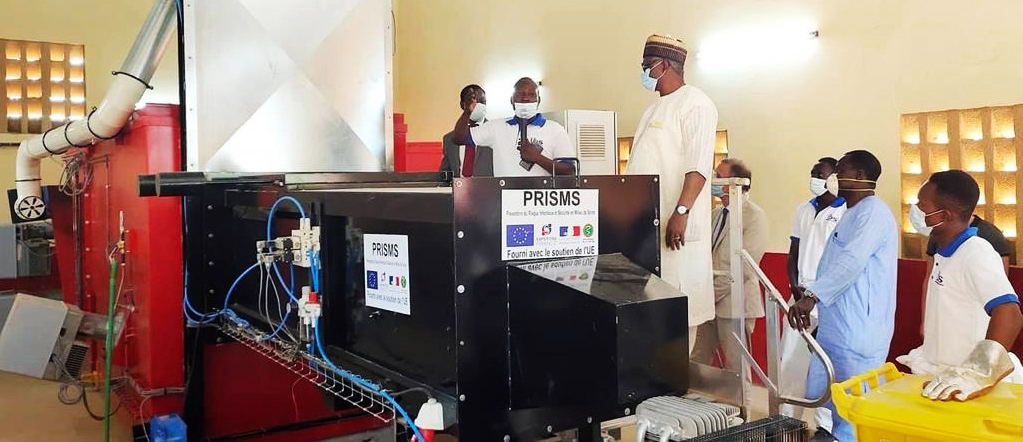Hospital hygiene and healthcare safety in Burkina Faso: “Bases designed to be strengthened”
The PRISMS project started in 2017. What was the state of play in terms of hospital hygiene and healthcare safety?
Dr. Arouna Traoré – Our first observation was the lack of coordination in terms of governance and the implementation of the national hospital hygiene and infection prevention policy. The lack of consultation between actors – between Ministry of Health services, the Ministry, the other actors and even within health facilities – prevented a coordinated management of hospital hygiene issues. For example, in certain hospitals, each service had its own equipment sterilisation unit. This impaired the effectiveness of implemented measures.
 The health crisis proves that it is essential to know and respect hygiene rules
The health crisis proves that it is essential to know and respect hygiene rules
The second problem was the uneven application of hospital hygiene rules in health facilities. With no standardised national guidelines and procedures, each hospital had developed their own, without them necessarily being consistent with international standards. For example, the personal protective equipment, such as gowns and masks, was not always of good quality or used properly. This lack of a normative framework and trained staff was observed in all the areas essential for maintaining hospital hygiene: hand hygiene, biomedical waste management, hospital cleaning, laundering of hospital linen… Yet the current health crisis proves that it is essential to know and respect hygiene rules to protect both patients and caregivers.
What strategy did the PRISMS project team adopt?
Dr. Arouna Traoré – The project’s objective was ambitious and we decided to take action where we could have greater added value.
 Take action where we could have greater added value
Take action where we could have greater added value
Firstly, it was necessary to assist the health authorities and especially help them define a single national framework for hospital hygiene and healthcare safety.
Secondly, at a more operational level, we had to ensure that these new rules are applied in hospitals, which requires both training and material resources. It is for these reasons that the European Union and Expertise France structured the PRISMS project based on two areas, in consultation with the Ministry of Health and, more generally, the health actors.
So, Burkina Faso now has a national framework for hospital hygiene?
Yes, it has. To help the Ministry of Health define it, we reviewed all the available documents to identify what should be retained, what should be completed or reviewed and what needed to be formulated.
 A total of 14 documents have been prepared, validated and disseminated
A total of 14 documents have been prepared, validated and disseminated
This subsequently allowed us to work on the documents, which set out standardised norms and procedures. A total of 14 documents have been prepared, initially drafted by an expert, then validated by the authorities and disseminated in health facilities: guide on the organisation and functioning of the committees to prevent and control healthcare associated infections, guide on the investigation and surveillance of healthcare associated infections, list of quantitative and qualitative indicators to evaluate the effectiveness of the measures, list of approved hygiene products and equipment, guide on good practices for antibiotic prescribing… These documents allow hospital managers to implement actions for hospital hygiene and healthcare safety.
The caregivers have had to take these new standards on board. How has the PRISMS project assisted this ownership?
At the beginning, we saw there was a lack of staff specialised in hospital hygiene. So, we initially helped strengthen the hygiene committees of each hospital and make operational their departments responsible for the quality of care. These are the actors responsible for defining the organisation of work and promoting good practices. So, they had to be well structured. It is now their role to propose actions to address the Covid-19 pandemic.
 The most important thing was to build the skills of caregivers
The most important thing was to build the skills of caregivers
The most important thing was then to build the skills of caregivers. We organised face-to-face training on themes adapted to everyone’s speciality – hand hygiene, sterilisation, biomedical waste, surgery… We also organised short courses in university hospitals and set up awareness-raising tools (audiovisual material, trainee course book for newcomers, hand hygiene day…).
To perpetuate the skills acquired beyond the current staff, we have contributed to training a pool of 45 national trainers, with a contribution from WHO, the university hospitals in Bordeaux and Montpellier and GERES for the preparation of the training plans. We have also helped set up a university diploma on hospital hygiene with Nazi Boni University (UNB) in Bobo-Dioulasso: the two training sessions have trained 52 people so far.
This means that Burkina Faso is now autonomous in training caregivers in hospital hygiene and has resource persons with a supervisory role. It can also facilitate national coordination with neighbouring countries on this issue.
What is your assessment of the PRISMS project?
One key point is that we have managed to adapt to the needs of our partners to ensure that the solutions proposed are effective and their results are as sustainable as possible.
 Propose solutions that are efficient, pooled or integrated into existing mechanisms
Propose solutions that are efficient, pooled or integrated into existing mechanisms
We have tried to propose solutions that are efficient, pooled or integrated into existing mechanisms. For example, this was the case for sterilisation at the Fada regional hospital, which has a common sterilisation unit for all the services. This approach has also been applied for biomedical waste (BMW) management. We had noted that there was not a clear understanding of the rules for BMW sorting, collection and destruction – the colour codes of the sorting bins were not systematically respected, only one of the country’s university hospitals had a functional incinerator, other facilities did not have staff trained in how to use them… Yet this waste is potentially infectious and poses a health or environmental risk if it is burned in the open or stored in a landfill, which was sometimes the case.
BMW management requires both training and equipment. We worked on these two components. In Ouagadougou, to share the operating costs, we decided to develop a pooled incineration platform for the city and its surroundings. This is a first in the West African subregion! Incinerators have also been delivered in the regions. This has been combined with training in preventive and curative maintenance to ensure these facilities are sustainable.
 Empower the authorities and health facilities to be autonomous
Empower the authorities and health facilities to be autonomous
The other key point is that we have tried to empower the authorities and health facilities to be autonomous over the issue of hospital hygiene. For example, through PRISMS, the six university hospitals and eight regional hospitals have been trained in how to produce hydroalcoholic solution, which is currently a valuable skill for the fight against Covid-19!
The authorities and caregivers are therefore now very aware of the issue of hospital hygiene and healthcare safety. PRISMS has established bases that will be strengthened by the Ministry of Health. For example, it is currently conducting an accreditation process for health facilities, based on a normative reference system which we have contributed to defining through the preparation of the national strategy for healthcare quality.
 PRISMS has established bases that will be strengthened
PRISMS has established bases that will be strengthened
But there is currently still a lack of equipment: this weakens the health system and puts both patients and caregivers at risk. The equipment and inputs provided by the PRISMS project are obviously not sufficient to address a potential spread of the Covid-19 pandemic to Burkina Faso. This raises the issue of financing, and therefore of the resources allocated to the country’s hospital hygiene and healthcare safety policy. Yet if the health system is weakened, it could have an impact on other diseases, such as HIV, tuberculosis, malaria and other chronic diseases which it will not be possible to treat properly.
More about the PRISMS project
For further reading: A new biomedical waste incinerator in Ouagadougou

Inauguration of the new biomedical waste incinerator in Ouagadougou on 17 April 2020.


